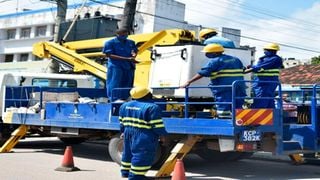
Kenya Power technicians carry out repairs on a transformer on Haile Selassie Road in Mombasa on December 5, 2020.
| File | Nation Media GroupCompanies
Premium
Inside MPs’ plan to end Kenya Power monopoly
What you need to know:
- The National Assembly's energy committee is proposing that IPPs using geothermal energy, with the help of KenGen, sell power directly to consumers.
- MPs want IPPs that agree to such an arrangement to first reduce their prices by benchmarking with what KenGen is offering before being allowed into the market
Consumers will have the choice of buying electricity tokens directly from Independent Power Producers (IPPs) or Kenya Power and Lighting and Company (KPLC) if MPs approve a proposal in a parliamentary committee report.
In a bid to tame KPLC's monopoly, the National Assembly's energy committee is proposing that IPPs using geothermal energy, with the help of KenGen, sell power directly to consumers as one of the ways to reduce the high cost of electricity in the country.
The proposal is contained in a draft report by the committee, which is currently in Mombasa writing its report on how to reduce the high cost of electricity in the country.
Highly placed sources in the committee told the Nation that the MPs want consumers to have a choice of buying their power from either KPLC or IPPs by choosing whichever is cheaper.
The proposal, if approved by MPs when the House resumes sitting on September 26, will be a departure from the current arrangement where IPPs produce power but have to sell to KPLC for customers to buy from them.
In the proposal, the MPs want IPPs that agree to such an arrangement to first reduce their prices by benchmarking with what KenGen is offering before being allowed into the market.
"The main purpose of this proposal is to give consumers a choice of where to buy their token and to give IPPs direct contact with customers. It is the IPPs that will decide the billing. If a customer feels that KPLC is expensive, they can opt for IPPs," the source said.
To achieve this, the MPs said they would make changes to the law and, if possible, amend the Power Purchase Agreements (PPAs) signed by the IPPs.
Sources within the committee said that while Kenya Power was opposed to the deal because of existing contracts with the IPPs, the MPs insisted that they would do what was necessary to not only give consumers a choice but also reduce the cost of electricity.
The lawmakers are also targeting the cancellation of contracts with five IPPs, who are currently being paid a total of Sh23 billion annually on a phased basis.
"The Sh23 billion we're paying annually means it's almost Sh1 billion a month, it's not just sustainable. Those will just have to go," the source said.
According to the draft report, the contracts will end after 36 months after the government has put in place enough infrastructure to ensure there is no vacuum when the five IPPs leave.
While some MPs wanted the contracts to end after 24 months, the technical team advising the committee is said to have disagreed, arguing that this was too short a period for the government to put infrastructure in place to fill the void left.
To make this proposal a reality, the committee has arranged another meeting with Attorney General Justin Muturi, National Treasury Cabinet Secretary Njuguna Ndung'u and his energy counterpart Davis Chirchir.
Mr Muturi, according to the source, will advise the committee on the legal implications of terminating the contracts midway, while Mr Ndung'u will provide the financial implications of what it will cost the taxpayer if the contracts are allowed to run until 2032 and if they are terminated now.
Mr Chirchir, on the other hand, will give the committee a picture of the time it will take the government to put the infrastructure in place if the contracts are terminated after three years.
The three were due to meet the committee this week, but as the committee had summoned Mr Chirchir and the KPLC CEO over Friday's blackout, the meeting was rescheduled for another day.
The draft report also calls for renegotiation of the PPAs on capacity charges and currency of payment, which it wants changed to shillings rather than the current USD.
In her presentation to the committee, the Auditor General said the PPAs signed by the government with the IPPs have no exit clause and any revision depends on the goodwill of the power producers.
The capacity charge is the amount paid to IPPs whether they generate power or not. It sets the minimum amount of electricity a generator is expected to supply to the national grid and is paid regardless of whether there is underproduction.
Capacity charges are passed on to consumers and contribute significantly to the cost of electricity.
The committee has also asked investigators to take action against individuals accused of conflict of interest by owning IPPs while still serving as state officials. The MPs are targeting a former PS and a former head of a key agency.
On vandalism, the committee proposes punitive measures for those found guilty. On system losses, the committee suggests that Kenya Power should build more transmission lines.
The committee found that some of the losses were deliberate to benefit a few powerful individuals at Kenya Power and the government.
The report is still in draft form and has not been formally adopted by the committee and therefore cannot be made public as it has also been tabled in Parliament and it would be against the Standing Orders for it to be made public now.
Some of the recommendations are also likely to change as a result of the discussions that the Committee will have with the Attorney General, CS Treasury and CS Energy.





